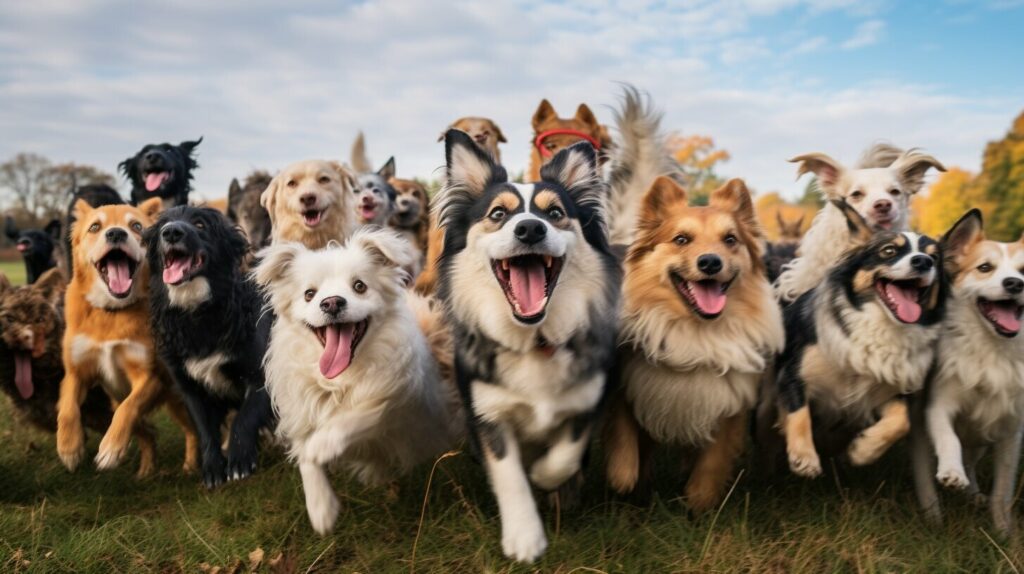If you are a pet owner, you may have heard of dogs dementia, also known as canine cognitive dysfunction. This condition is similar to Alzheimer’s disease in humans and affects dogs as they age, causing changes in behavior and mental functioning. As a pet owner, it is important to understand the signs, causes, and treatments of dogs dementia to ensure the best quality of life for your furry friend.
Key Takeaways:
- Dogs dementia, or canine cognitive dysfunction, is a condition that affects dogs as they age.
- The signs of dogs dementia include confusion and disorientation, changes in behavior, and memory loss.
- There are treatment options available, including medications and behavioral therapy, as well as practical tips for managing dogs dementia at home.
- Supportive care and promoting quality of life for dogs with dementia are essential for their overall wellbeing.
What is Dogs Dementia?
Dogs dementia, also known as canine cognitive dysfunction, is a condition that affects older dogs and is similar to Alzheimer’s disease in humans. It is a progressive disorder that affects cognitive function, including memory loss, disorientation, and changes in behavior.
As dogs age, their brains undergo changes that can cause cognitive decline. These changes may include the buildup of proteins in the brain, reduced blood flow, and the loss of brain cells.
Signs of dementia in dogs may include disorientation, confusion, decreased activity level, changes in appetite, and altered sleep patterns. Your dog may also have difficulty recognizing familiar people and objects, and may become anxious or restless.
If you suspect that your dog may be suffering from dementia, it is important to consult with your veterinarian. A thorough evaluation can help determine the cause of your dog’s symptoms and the best course of treatment.
Causes of Dogs Dementia
As dogs age, they may experience changes in their cognitive function. Older dogs are more likely to develop dogs dementia, also known as canine cognitive dysfunction. This condition is similar to Alzheimer’s disease in humans.
One of the causes of dogs dementia is aging. As dogs get older, their brains undergo structural and functional changes that can lead to cognitive decline. These changes can affect a dog’s memory, learning, and ability to process information. Another cause of dogs dementia is the accumulation of abnormal proteins in the brain, which can cause damage to the neurons and brain tissue.
In addition to aging and brain changes, other factors can contribute to dogs dementia. These include genetics, underlying medical conditions, and environmental factors such as poor nutrition and lack of mental stimulation. In some cases, dogs dementia can be a result of an injury or illness, such as a brain tumor or infection.
One of the most common signs of dogs dementia is memory loss. A dog with cognitive dysfunction may have trouble remembering familiar people, objects, or routines. They may also appear confused or disoriented, and have difficulty navigating their environment. Other signs of dogs dementia include changes in appetite or sleeping patterns, decreased activity levels, and changes in behavior, such as increased anxiety or aggression.
If you suspect your dog may be showing signs of cognitive dysfunction, it is important to seek veterinary care. Your vet can help rule out any underlying medical conditions that may be contributing to your dog’s symptoms and recommend the appropriate course of treatment.
Recognizing the Signs of Dogs Dementia
Dogs dementia, also known as canine cognitive dysfunction, is a progressive degenerative disease that affects the brain function of older dogs. As dogs age, their cognitive abilities decline, which can lead to confusion, disorientation, and memory loss. Here are some signs to look out for that may indicate your dog is suffering from dementia:
- Disorientation: Your dog may appear lost or confused, even in familiar surroundings.
- Changes in behavior: Your dog may become irritable, restless, or anxious.
- Loss of appetite: Your dog may lose interest in food or forget that they have already eaten.
- Difficulty sleeping: Your dog may become restless at night or sleep more during the day.
- Loss of housebreaking skills: Your dog may start having accidents in the house.
- Memory loss: Your dog may forget familiar people or routines.
In some cases, dogs with dementia may exhibit signs that are similar to Alzheimer’s disease in humans, such as staring blankly or wandering aimlessly. If you notice any of these signs in your dog, it’s important to take them to your veterinarian for an evaluation.
Diagnosis and Treatment of Dogs Dementia
If you suspect your dog is suffering from dementia, it is important to seek veterinary attention as soon as possible. Your veterinarian will conduct a thorough physical exam and may also recommend blood tests, urinalysis, or imaging tests such as an MRI to rule out any underlying medical conditions that may be contributing to your dog’s symptoms.
Although there is no known cure for dogs dementia, there are several treatment options available that can help manage the symptoms and slow down the progression of the disease.
Medications: There are several medications that may be prescribed to help manage some of the symptoms of dogs dementia, such as anxiety, confusion, and sleep disturbances. These include anti-anxiety drugs, antidepressants, and cognitive enhancers.
Behavioral therapy: Behavioral therapy can help improve your dog’s cognitive function and reduce their anxiety and stress levels. This may include activities such as puzzle games, obedience training, or scent work.
Dietary changes: Some studies suggest that a diet rich in antioxidants and omega-3 fatty acids may help slow down the progression of dogs dementia and improve cognitive function. Your veterinarian may recommend a specialized diet or supplements to support your dog’s brain health.
It is important to work closely with your veterinarian to find the best treatment plan for your dog’s individual needs. With proper management and support, many dogs with dementia can maintain a good quality of life for several years.
Managing Dogs Dementia at Home
If your senior dog has been diagnosed with dementia, there are practical steps you can take at home to help manage their symptoms and improve their quality of life.
Environmental modifications can be particularly helpful for dogs with dementia. Provide a safe and comfortable space for your dog to rest, with easy access to food, water, and a familiar bed. Block off any hazardous areas of the house, such as stairs or balconies, to prevent falls. You may also want to consider using baby gates to limit your dog’s access to certain areas of the house.
Mental stimulation is important for dogs with dementia, who may become bored or agitated if left alone for long periods of time. Provide your dog with toys that are easy to manipulate or puzzles designed specifically for dogs with cognitive dysfunction. Engage in interactive playtime and regular walks, being mindful of your dog’s physical limitations.
Nutrition is also key for managing dogs dementia. Speak with your veterinarian about an appropriate diet for your senior dog, taking into account any underlying medical conditions. You may also want to consider adding supplements such as omega-3 fatty acids or antioxidants to your dog’s diet to support their cognitive function.
Regular veterinary check-ups are essential for monitoring your dog’s overall health and addressing any new or worsening symptoms of their dementia. Your veterinarian may recommend medications or other treatments to help manage your dog’s symptoms, as well as provide guidance on managing any comorbidities or complications that may arise.
Finally, providing comfort and companionship can help to reduce stress and promote quality of life for dogs with dementia. Stick to a consistent routine as much as possible, providing regular opportunities for rest, play, and socialization. Offer plenty of affection and reassurance, even if your dog no longer recognizes you in the same way they once did.
Supportive Care for Dogs with Dementia
Managing dogs dementia requires regular veterinary check-ups and supportive care to maintain their overall wellbeing. As a pet owner, you can make some changes in your pet’s daily routine and environment to improve their quality of life and manage their symptoms. Here are some tips for supportive care:
- Establish a routine: Dogs with dementia may feel lost and confused, creating a daily routine of feeding, walking, and playtime can help them feel more secure and comfortable.
- Reduce stress: Dogs with dementia can get easily agitated, so provide a calm and relaxing environment. You can use pheromones, noise reduction techniques, and soothing music to create a stress-free environment.
- Nutrition: Proper nutrition is essential for managing dogs dementia. Make sure you feed your dog a well-balanced diet that suits their age and nutritional needs. You can also consult with your veterinarian about adding supplements to their diet to improve cognitive function.
- Mental stimulation: Mental stimulation is vital for dogs with dementia to keep their brain active. You can offer puzzle toys, interactive games, and training sessions to keep your dog’s mind active.
- Comfort and companionship: Dogs with dementia may feel lonely and isolated, so provide them with ample comfort and companionship. You can spend more time with your dog, cuddle with them, or even hire a pet sitter to keep them company when you’re away.
These supportive care tips can make a significant difference in managing your dog’s dementia symptoms and improving their overall quality of life. Remember to consult with your veterinarian regularly and make appropriate modifications to your pet’s care routine as needed.
Promoting Quality of Life for Dogs with Dementia
If your dog has been diagnosed with dementia, there are several ways you can promote their quality of life and help manage their condition. Here are some tips to help you manage dementia in dogs:
Create a Routine
Schedule your dog’s day with a consistent routine to help them feel more secure and comfortable. This can include regular feeding times, walks, and playtime. Keeping a consistent routine can help reduce anxiety and confusion in dogs with dementia.
Reduce Stress
Dogs with dementia can become easily stressed or anxious, which can exacerbate their symptoms. To reduce stress, create a calm and quiet environment for your dog. Limit noise and other distractions, and ensure your dog has a comfortable and safe place to rest.
Provide Mental Stimulation
Keeping your dog mentally stimulated can help slow the progression of dementia and improve their overall well-being. Engage your dog in interactive games, puzzles, and other activities that challenge their mind. You can also consider using puzzle feeders or hiding treats around the house to encourage exploration and problem-solving.
Provide Comfort and Companionship
Dogs with dementia can become confused and disoriented, so it’s important to provide comfort and companionship. Spend quality time with your dog, offering cuddles and reassurance. Consider using a pheromone collar or diffuser to help calm and comfort your dog.
Adjust Their Diet
Dogs with dementia may have a reduced appetite or difficulty eating, so it’s important to adjust their diet accordingly. Offer smaller, more frequent meals throughout the day to help maintain their weight and nutrition. You can also talk to your vet about special diets or supplements that may be helpful for dogs with dementia.
Regular Veterinary Check-ups
Regular veterinary check-ups are important for dogs with dementia to monitor their overall health and well-being. Your vet may recommend changes to your dog’s treatment plan or offer additional support and resources for managing their condition.
Stay Positive
Caring for a dog with dementia can be challenging, but it’s important to stay positive and patient. Remember that your dog still needs your love and companionship, and with the right care and support, they can continue to enjoy a good quality of life.
Conclusion
Managing dogs dementia can be a challenging task, but early detection and proper management can significantly improve your senior dog’s quality of life. Canine cognitive dysfunction, also known as dogs dementia, is a condition that is prevalent in older dogs, and identifying its symptoms and causes is critical.
Managing dementia in dogs requires a multi-faceted approach that includes environmental modifications, mental stimulation, and nutrition. Regular veterinary check-ups and monitoring their overall well-being also play an essential role in supporting dogs with dementia. Providing comfort and companionship is vital to promoting quality of life for dogs with cognitive dysfunction.
Remember, managing dementia in dogs is all about maintaining a routine, reducing stress, and providing comfort and companionship. With proper care, dogs with dementia can still lead happy and comfortable lives. If you notice any signs of dementia in older dogs, such as confusion, disorientation, or memory loss, consult your veterinarian immediately. They will be able to provide you with the necessary tools and treatment options to manage your dog’s condition.
FAQ
Q: What is dogs dementia?
A: Dogs dementia, also known as canine cognitive dysfunction, is a condition that affects older dogs and is characterized by changes in behavior, disorientation, and memory loss. It is similar to Alzheimer’s disease in humans.
Q: What are the signs of dogs dementia?
A: Signs of dogs dementia may include disorientation, changes in sleep patterns, increased anxiety or restlessness, loss of housetraining, and decreased interest in activities or interactions.
Q: What causes dogs dementia?
A: Dogs dementia can be caused by a variety of factors, including aging, changes in the brain’s chemistry and structure, and genetics. Other medical conditions such as thyroid or kidney disease can also contribute to cognitive decline in dogs.
Q: How is dogs dementia diagnosed?
A: Dogs dementia is typically diagnosed based on the dog’s medical history, physical examination, and behavioral changes. Additional tests such as blood work and imaging may be done to rule out other underlying conditions.
Q: What treatments are available for dogs dementia?
A: Treatment options for dogs dementia may include medications to improve brain function, dietary supplements, environmental enrichment, and behavioral therapy. It’s important to work closely with your veterinarian to determine the best approach for your dog.
Q: How can dogs dementia be managed at home?
A: Managing dogs dementia at home involves creating a safe and stimulating environment, maintaining a consistent routine, providing mental stimulation through puzzle toys or training exercises, and ensuring a balanced diet and regular exercise.
Q: What supportive care should be provided for dogs with dementia?
A: Supportive care for dogs with dementia includes regular veterinary check-ups to monitor their overall health, adjusting their environment to reduce stress, and providing comfort and companionship.
Q: How can quality of life be promoted for dogs with dementia?
A: To promote quality of life for dogs with dementia, it’s important to maintain a routine, minimize stress and anxiety, provide comfort through soothing music or blankets, and ensure they have opportunities for mental and physical stimulation.



